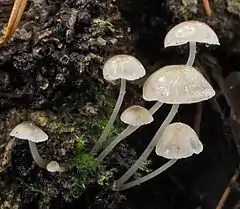Phloeomana
Phloeomana is a bark-inhabiting agaric fungal genus that produces fuscous-colored to whitish mycenoid to omphalinoid fruit bodies in temperate forests. In addition to the type species Phloeomana speirea,[1] 4 other species, P. alba,[2] P. clavata[3][4] (= M. thujina, M. phaeophylla), P. hiemalis[2][5][6] and P. minutula (formerly Mycena olida),[2] have been placed in the genus.[7][8][9] The genus is characterized by nonamyloid smooth, hyaline (translucent) basidiospores and tissues, poorly to moderately differentiated cheilocystidia, diverticulate pileipellis hyphae and general smooth stipe hyphae with scattered caulocystidia.[1] It is one of several mushroom genera formerly classified most recently in Mycena, Omphalina, Hydropus, or Marasmiellus. Phylogenetically, Phloeomana is distant from the Mycenaceae and is closest to a clade or group that includes other former members of Mycena now in Atheniella and Hemimycena clearly excluded from the Mycenaceae and tentatively classified in the Porotheleaceae.
| Phloeomana | |
|---|---|
 | |
| Phloeomana speirea | |
| Scientific classification | |
| Kingdom: | |
| Division: | |
| Class: | |
| Order: | |
| Family: | |
| Genus: | Phloeomana Redhead (2013) |
| Type species | |
| Phloeomana speirea (Fr.) Redhead (2013) | |
| Species | |
|
P. alba | |
Etymology
The name Phloeomana is an oblique reference to bark and phloem on which it grows and the oceanic term, 'mana' in reference to a being or spirit, hence a bark spirit.[1]
See also
References
- Redhead SA. (2013). "Nomenclatural novelties" (PDF). Index Fungorum. 15: 1–2.
- Maas Geesteranus RA (1991). "Conspectus of the Mycenas of the Northern Hemisphere - 15 Sections Hiemales and Exornatae". Proc. Kon. Ned. Akad. v. Wetensch. 94 (1): 81–102.
- Redhead SA (1986). "Mycological Observations 15-16 on Omphalia and Pleurotus". Mycologia. 78 (4): 522–528. doi:10.2307/3807763.
- Ronikier A, Aronsen A. (2007). "Type study of Mycena phaeophylla reveals its conspecificity with M. clavata". Mycologia. 99 (6): 924–935. doi:10.3852/mycologia.99.6.924.
- Maas Geesteranus RA (1979). "Three Mycenas revised". Persoonia. 10 (2): 277–282.
- Robich G. (2000). "Su una Mycena e una Mycenella". Rivista di Micologia. 43 (3): 237–247.
- Redhead SA. (2016a). "Nomenclatural novelties" (PDF). Index Fungorum. 289: 1.
- Redhead SA. (2016b). "Nomenclatural novelties" (PDF). Index Fungorum. 290: 1.
- Redhead SA. (2016c). "Nomenclatural novelties" (PDF). Index Fungorum. 291: 1.